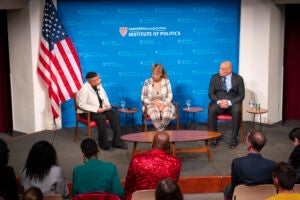
Photo by Steffen Jänicke
Well-meaning tyranny of identity politics
Yascha Mounk chronicles how ideology took over, where it went wrong
Excerpted from “The Identity Trap: A Story of Ideas and Power in Our Time” by Yascha Mounk, Ph.D. ’15, Local Affiliate of Minda de Günzburg Center for European Studies
Eboo Patel was born in Chicago, the son of a Muslim immigrant from India who came to the country as a poor student and worked his way up to relative riches by taking out franchises on Subway sandwich stores. He was raised in the city’s affluent suburbs, enjoying the opportunities of an upper-middle-class life while deeply self-conscious about the ethnic and religious differences that separated him from most of his classmates.
So when Patel first learned about “institutionalized racism” and “structures of oppression” as a sociology major at the University of Illinois, the vocabulary of the identity synthesis (an ideology sometimes called identity politics) helped him make sense of his own experiences. White supremacy, he read in one class, consisted of the belief that “cultural patterns associated with white people” are the norm, marking those associated with other groups as inferior. He thought to himself, “Doesn’t that basically describe my entire life?”
Patel’s view of his childhood changed radically. One time, he now remembered, he had accompanied his father to a conference of South Asian businessmen. When an audience member wanted to know why he had taken out a franchise on a Subway store rather than starting a sandwich shop of his own, his father retorted with a question: “Which white people do you know are going to buy sandwiches from a brown guy born in India named Sadruddin?”
At the time, his father’s response had seemed unremarkable to Patel. But now he came to see it as a testament to the racism that surrounded him everywhere he looked: “The deeper I read, the more I saw the entire world through that lens. I soon couldn’t see much else. Racism permeated everything. My principal identity was as a victim of racism.”
Patel, in other words, fell into the identity trap. He stopped noticing the ways in which his upbringing had been one of opportunity and privilege. He became censorious, sitting in judgment of anybody who did not share his values or his worldview in every respect. When one of his progressive professors, a Black woman who had kindly agreed to conduct an independent study with him, staged a play that was meant to center on the experience of children, he thought that he would make her proud by finding fault with it: “What about all the families where kids don’t have their own rooms?” he asked at a question-and-answer session after the show. “Or the Black and brown families that don’t have houses? Don’t you realize that your play is only further oppressing them?”
A few days later, Patel’s professor emailed him. She gently explained that she was hurt by his comments. Instead of passing judgment on the efforts of others, he should try his hand at creating something better. The email made a big impression. “I know that there is a role for people who sit in the audience and criticize the show, but it was starting to dawn on me that that’s not who I wanted to be. I wanted to be the person putting something on the stage.”
Gradually, Patel realized that the ideology that seemed to explain his world had serious blind spots of its own. It’s not just that its portrayal of the world did not allow for any gray tones. It’s that it seemed to lead Patel away from the kind of life he himself wanted to live. The concepts he had learned in college encouraged Patel to see the worst in people. But as he matured, he realized that he wanted to encourage people to be their best selves — and aspired to build something of value himself.
Now that Patel himself has become a father, he is determined to impart a more positive outlook to his children. “I would be remiss in my duties if I allowed my kids to fall into the same victim mind-set that I succumbed to as a college student,” he recently wrote. “I want my two sons to understand that responsible citizenship in a diverse democracy is not principally about noticing what’s bad; it’s about constructing what’s good.”
Maurice Mitchell has undergone a similar evolution. As a longtime progressive activist, a key organizer of the Movement for Black Lives, and now the head of the Working Families Party, Mitchell used to believe that the core precepts of the identity synthesis could help him combat injustice. But today he is deeply worried about the way in which its ideas are reshaping America, including some of the progressive organizations he knows intimately. As he wrote in a recent article, “Executives in professional social justice institutions, grassroots activists in local movements, and fiery young radicals on protest lines are all advancing urgent concerns about the internal workings of progressive spaces.” Drawing on their own experiences, they lament how “toxic” the atmosphere within such organizations has become, making it hard to get anything done.
One of the main culprits for this failure, Mitchell argues, is a simplistic understanding of identity. In the article, he takes particular aim at the way in which many activists and politicians invoke their heritage as a justification for their political position. “What’s implied,” Mitchell writes, “is that one’s identity is a comprehensive validator of one’s political strategy — that identity is evidence of some intrinsic ideological or strategic legitimacy. Marginalized identity is deployed as a conveyor of a strategic truth that must simply be accepted.” But though this assumption may be popular, it is dangerously flawed: “Identity is too broad a container to predict one’s politics or the validity of a particular position. … Genuflecting to individuals solely based on their socialized identities or personal stories deprives them of the conditions that sharpen arguments, develop skills, and win debates.”
Patel and Mitchell are no outliers. Many other reluctant critics of the identity trap now find themselves in a similar position. Because they are highly progressive and deeply conscious of the injustices still shaping America, they initially greeted the arrival of the identity synthesis with curiosity or even enthusiasm. Now they are growing seriously concerned about the destructive influence it has had on causes and communities in which they are invested. The more deeply we have gotten stuck in the identity trap, the more opposition it is generating. Will this backlash be enough to reverse the trends of the past decade, relegating the influence of the identity synthesis to a strange yet short-lived moment in the history of the United Kingdom, the United States, and other democracies around the world?
The identity synthesis has been adopted in the highest echelons of society at remarkable speed. Many schools have embraced the logic of progressive separatism, encouraging their students to see themselves primarily in terms of their ethnic or sexual identity. Key cultural institutions have accepted the idea that forms of cultural appropriation are inherently harmful, and will continue to patrol novels and movies, artworks and exhibitions for possible violations of this new norm. Major corporations have institutionalized diversity, equity, and inclusion trainings based on the ideas of Robin DiAngelo and Ibram X. Kendi and will continue to spread that Manichaean worldview to their employees. Finally, big swaths of the Democratic Party have imbibed the rhetoric of equity and will likely stay committed to identity-sensitive public policies that make the way the state treats people depend on such factors as the color of their skin.
Increasingly, the influence of the identity synthesis is also being felt outside the United States. In Canada, public schools in the province of Ontario, following the advice of a senior member of the ruling Liberal Party, staged ceremonial burnings of supposedly “offensive” books in a “flame purification ceremony.” In Britain, serious threats of violence from students at her own university forced a well-known philosopher to resign her teaching post because of her views on the nature of gender and biological sex. In Switzerland, the performance of a rock band was canceled at the last moment because its lead singer, who is white, has worn dreadlocks since he was a teenager. And in Spain, a publishing house decided that it was morally unacceptable for a white man to translate the work of a prominent Black poet.
In light of these disheartening developments, many observers have concluded that it is too late to escape the identity trap. The game, they suggest, is effectively up. As Andrew Sullivan has observed, “We all live on campus now.”
But what confident predictions about the lasting victory of the identity synthesis seem to miss is the way in which its very success has gradually put off people like Patel and Mitchell. The changes to America’s elite culture that took place over the course of the past decade have been so rapid that they were virtually complete before most people even had a chance to understand their nature or their consequences. But as the influence of the identity synthesis has grown, the perverse effect it is having on myriad communities and organizations across the country is coming into clearer view. As a result, many people who were initially reluctant to express their displeasure about the identity trap are starting to recognize its serious drawbacks, and even to muster the courage to speak out against it.
This pushback is already showing first signs of success. Over the past couple of years, many companies and nonprofit organizations have attracted public outrage for unfairly dismissing their employees or slandering their business partners; as a result, institutional leaders around the country are starting to recognize that giving in to moral panics on social media carries as much risk as refusing to do so. Meanwhile, the courts are playing an important role in rolling back some of the most blatant excesses of the identity synthesis, including mandatory trainings by public agencies that effectively compel state employees to pay lip service to this ideology. The more advocates of the identity synthesis try to put their aspirations into practice, the clearer it becomes that they stand in direct tension with the moral convictions of the great majority of Americans.
Over the past year or so, there have even been signs that the identity trap is starting to fall out of fashion. On social media, performative acts of self-flagellation by white journalists who once garnered thousands of likes for their supposed bravery now encounter polite eye rolls or outright mockery. Cultural journalists briefly obsessed over a small scene of New York writers and artists who congregated around the Dimes Square neighborhood in lower Manhattan during the pandemic, in part because their “vibe” seems to stand in stark contrast to the “woke” ethos that had ruled the city’s artistic and literary scenes in the preceding years. Points of view that were once considered too controversial or “heterodox” for the pages of The Washington Post and The New York Times are slowly making their way into mainstream publications. Even leaders of the Democratic Party are taking note that the scolding tone that has dominated left-of-center discourse for the past decade is doing serious damage to its political prospects. Appearing on “Pod Save America,” a progressive podcast run by four of his former staffers, a few weeks before the 2022 midterms, Barack Obama warned that “sometimes people just want to not feel as if they are walking on eggshells. They want some acknowledgment that life is messy and that all of us, at any given moment, can say things the wrong way.”
This provides the fodder for a diametrically opposed set of predictions about the likely future of the identity synthesis. As its excesses escape campus, come into public view, and generate more and more pushback, the opponents of the identity trap will, in this scenario, win an unconditional victory. The influence of the identity synthesis is likely to wane over the course of the coming years. “In the 1960s, left-wing radicals wanted to overthrow capitalism. We ended up with Whole Foods,” David Brooks notes in The New York Times. Similarly, “the co-optation of wokeness seems to be happening right now.”
Most of the predictions about the likely future of the identity trap oscillate between these two poles, foretelling either its lasting victory or its imminent demise. But there is also a third possibility, one that may be more plausible than either of these extremes. In this scenario, many of the core assumptions of the identity synthesis have become so entrenched in the ideology and the institutions of mainstream America that they are here to stay. Some illiberal norms, including unforgiving social sanctions for unpopular speech, the need to pay lip service to a Manichaean version of antiracism, and the occasional witch hunt against innocents, are likely to remain part of the culture of America’s most influential institutions for the foreseeable future.
At the same time, the growing resistance to the identity trap will make it more feasible to undo some of its worst excesses. Other illiberal norms, including the most extreme prohibitions on forms of so-called cultural appropriation and the most blatant attempts by the state to discriminate between citizens on the basis of their race, are likely to prove short-lived. The next decades will, in other words, consist of a protracted fight over the extent to which the worlds of culture and education, business and politics will be governed by the core ideas and assumptions of the identity synthesis.
According to this third scenario — which I consider the most likely— the forces favoring the identity trap and the forces favoring its retrenchment will continue to clash for many years to come. After decades in which ideological debates felt marginal to politics, we are back to having a serious and protracted dispute about the nature of our societies and the best way to govern them. The overall outcome will be neither a complete rout for the identity synthesis nor its definitive victory. Rather, the conflict over the extent to which we should reject liberalism and embrace the identity synthesis is likely to shape the front lines in some of the most important intellectual debates and political battles of the coming decades.
Reprinted by arrangement with Penguin Press, a member of Penguin Group (USA) LLC, A Penguin Random House Company. Copyright © Yascha Mounk, 2023.




